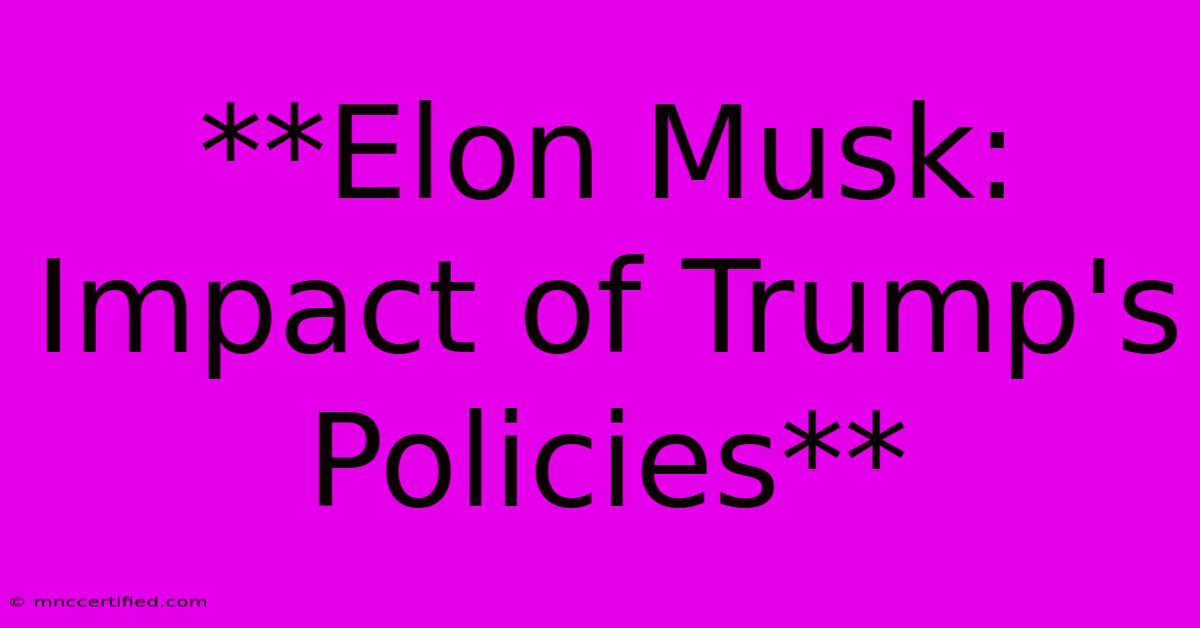**Elon Musk: Impact Of Trump's Policies**

Table of Contents
Elon Musk: The Complex Relationship with Trump's Policies
Elon Musk, the visionary entrepreneur behind Tesla and SpaceX, has become a prominent figure in the world of technology and business. His outspoken nature and ambitious ventures have drawn both admiration and criticism, and his relationship with former President Donald Trump's policies has been particularly complex and often contentious.
A Complex History:
While Musk has often been critical of government regulations, he has also sought support from the government, particularly in the form of subsidies and tax breaks for his companies. This need for government assistance has created a tension in his relationship with Trump's policies, which were often focused on deregulation and tax cuts.
Early Support and the Rise of Uncertainty:
In the early days of Trump's presidency, Musk appeared to be supportive of some of his policies, particularly those related to deregulation. He praised the Tax Cuts and Jobs Act of 2017, which lowered corporate tax rates, arguing that it would be beneficial for Tesla. Musk also joined Trump's advisory council on manufacturing, further fueling speculation about his support for the administration.
However, the relationship became increasingly strained over time. Musk publicly criticized Trump's withdrawal from the Paris Agreement on climate change, a decision that contradicted Tesla's commitment to sustainable energy. He also expressed disapproval of Trump's tariffs on Chinese goods, which threatened to disrupt Tesla's supply chain.
A Breaking Point:
A turning point came in June 2018, when Trump announced his intention to impose tariffs on imported cars. Musk, fearing a negative impact on Tesla, tweeted that the tariffs would "be very, very bad for Tesla" and would likely force the company to move production out of the United States. This public criticism, along with Trump's subsequent dismissal of Musk as a "very good guy" who was "not exactly a fan" of his policies, marked a significant shift in their relationship.
Navigating a Divided Landscape:
Musk's public stances on Trump's policies reflected the broader political and social divide in the United States. While some saw him as a champion of innovation and progress, others criticized his support for deregulation and his opposition to environmental regulations.
Beyond Trump:
While the relationship between Musk and Trump's policies has been widely discussed, it's important to remember that the impact of those policies on Tesla and SpaceX extends beyond the realm of politics. The global economic climate, market fluctuations, and technological advancements all play a role in shaping the success or failure of Musk's companies.
The Future of Musk and Politics:
It remains to be seen how Musk will navigate the political landscape in the years to come. His outspoken nature and ambitious goals suggest that he will continue to engage in public debate and advocate for policies that he believes will benefit his companies and the future of technology.
Key takeaways:
- Elon Musk's relationship with Trump's policies was complex and often contentious.
- Early support for deregulation and tax cuts gave way to public criticism of Trump's climate change policies and tariffs.
- Musk's views on Trump's policies reflected the broader political divide in the United States.
- The impact of Trump's policies on Tesla and SpaceX goes beyond politics, influenced by global economics and technological advancements.
- Musk's future engagement with political discourse remains to be seen.
This article aims to provide a nuanced understanding of the relationship between Elon Musk and Trump's policies, highlighting the complexities and contradictions that defined this dynamic. While this article focuses on the impact of Trump's policies, it acknowledges that other factors contribute to the success of Musk's ventures.

Thank you for visiting our website wich cover about **Elon Musk: Impact Of Trump's Policies**. We hope the information provided has been useful to you. Feel free to contact us if you have any questions or need further assistance. See you next time and dont miss to bookmark.
Featured Posts
-
Trump Win Fuels Dogecoin Surge Up 8
Nov 07, 2024
-
Does Medical Insurance Cover Atv Accidents
Nov 07, 2024
-
Life Insurance Companies In San Antonio Tx
Nov 07, 2024
-
Daniel Lurie Frontrunner In Sf Race
Nov 07, 2024
-
Rigetti Regains Nasdaq Compliance
Nov 07, 2024